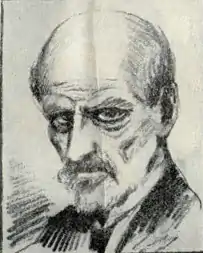Petar Ičko
Petar Ičko (Serbian Cyrillic: Петар Ичко, c. 1755–1808) was an Ottoman and later Serbian diplomat, a merchant by profession from Ottoman Macedonia.
Petar Ičko | |
|---|---|
 | |
| Born | c. 1755 |
| Died | 5 May 1808 |
| Nationality | Rum Millet |
| Occupation | Diplomat and merchant |
| Known for | Representative of Serbian rebels during First Serbian Uprising; Ičko's Peace |
Biography
According to some sources he was of Aromanian descent,[1][2][3] born in the village of Katranitsa, at the time in the Ottoman Empire (today Pyrgoi, Greece), a place with developed merchant traditions. He resettled to the north, managing his own commercial business, and was employed as a dragoman in Ottoman diplomatic missions in Berlin and probably in Vienna. Settling in Ottoman Belgrade towards the end of the 18th century, he became an affluent merchant. He closely collaborated with the Vizier of the Pashaluk of Belgrade, Hadži Mustafa Pasha, and according to some sources both of them were members of one Masonic Lodge.[4] After the return to power of the renegade Janissaries (Dahije), he was forced in 1802 to move to Zemun, at that time a Habsburg Military Frontier town. After the outbreak of the First Serbian Uprising (1804), he began supporting and working with the Serbian rebels led by Karađorđe. He rendered them some valuable advice thanks to his diplomatic and trade skills. The rebel leaders sent him as their representative in Constantinople where he managed to obtain for them a favourable peace treaty, known as "Ičko's Peace". He returned and lived in Belgrade as an honorary citizen, but died there soon after, on 5 May 1808, probably poisoned.
His son Naum Ičko established the "Question-mark" bistro in 1823. His house is preserved today as "Ičko's House"
Annotations
He was surnamed Itskoglou (Greek: Ιτσκογλου),[5] rendered in Serbian as Ičkoglija (Ичкоглија)[6][7] and Ičkoglić (Ичкоглић).[8]
See also
References
- Даница Вукићевић; Симо Ц Ћирковић (2007). Српска породична енциклопедија. 11. Народна кјнига. p. 72. ISBN 9788633127400.
- Д. Ј. Поповић (1998) [1927]. О цинцарима: прилози питању постанка нашег грађанског друштва. Прометеј. p. 257. ISBN 978-86-82363-15-6.
- Nicolaos Mertzos (2011). "Βλαχόφωνη Ρωμιοσύνη" (PDF). Thessaloniki: Company of Macedonian Studies: 31. Cite journal requires
|journal=(help) - Ćorović 1997
Ima vesti, da su Mustafa i Ičko bili u tešnjim vezama i kao članovi jedne slobodnozidarske lože u Beogradu, kojoj je možda pripadao i Aziz efendija.
- Hellēnes kai Servoi kata tous apeleutherōtikous tōn agōnas, 1804-1830. Typois G.P. Xenou. 1936.
Ό διαπραγματευθεις την σερβοτουρκικήν συνθήκην τοΰ 1806, ΓΙέιρος "Ιτσκος ή "Ιτσκογλου ήτο "Ελλην εκ Κατρανίτσης της Μακεδονίας. Ό "Ελλην μητροπολίτης Βελιγραδίου Λεόντιος άμα τή έκρήξει τοΰ κινήματος έτέθη παρά τό πλευρόν τών ...
- Béla K. Király; Gunther Erich Rothenberg (1982). War and Society in East Central Europe: The first Serbian uprising 1804-1813. Brooklyn College Press. p. 196. ISBN 978-0-930888-15-2.
- Hristo Adonov-Poljanski (1985). Documents on the Struggle of the Macedonian People for Independence and a Nation-state: From the settlement of the Slavs in Macedonia up to the end of the First World War. Kultura. p. 181.
- Vukićević 1905.
Sources
- Milićević, Milan (1888). Поменик знаменитих људи у српскога народа новијега доба. Srpska kraljevska štamparija. pp. 186–189. (Public Domain)
- Nenadović, Matija (1893). Kovačević, Ljubomir (ed.). Мемоари Матије Ненадовића [Memoirs of Matija Nenadović]. Srpska književna zadruga. pp. 63, 67. (Public Domain)
- Novaković, Stojan (1904). Устанак на дахије 1804 [Uprising on the Dahije 1804]. Belgrade: Државна штампарија. (Public Domain)
- Vukićević, Mil. (1905). "Неколико прилога за расветљење ичкова мира". Дело. Belgrade: Штампарија "Доситеј Обрадовић". 34: 265–270.
- Михаило Гавриловић (1903), Богдан Поповић (ed.), "Ичков мир", Српски књижевни гласник (IX. 2), archived from the original on 2016-02-06
- Stanford Jay Shaw. Between Old and New: the Ottoman Empire under Sultan Selim III, 1789-1807. Cambridge, Massachusetts, Harvard University Press, 1971, pp. 342–356.
- Paul Frederic Shupp. The European Powers and the Near Eastern Question, 1806-1807, Columbia university press, 1931, pp. 179–180.
- Anatoliĭ Filippovich Miller. Mustapha Pacha Baĭraktar. Association internationale d'études du Sud-Est européen, 1975, p. 404.
- Trajan Stojanovich. "The Conquering Balkan Orthodox Merchant", Journal of Economic History, XX (June, 1960), pp. 234–313.
- Ćorović, Vladimir (1997). "Почетак устанка у Србији". Istorija srpskog naroda. Ars Libri. Retrieved December 7, 2012.